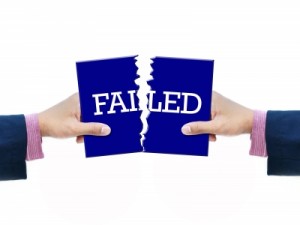The news that 2010 Apprentice winner Stella English has been fired by Alan Sugar comes as a surprise, but I have a feeling she’ll take it in her stride. From burning the toast to botching our driving tests (four times in my case), failure is something we adults cope with on a daily basis – some better than others.
The hardest failures of all to deal with are those of our children. If your son comes last in every Sports Day race or your daughter just misses a much-wanted C grade at GCSE, it’s heart-wrenching. As adults we know that to fail is not to become a failure – it just means you haven’t succeeded yet, but the challenge for us is to communicate this to the young people in our care.
If at first you don’t succeed, try, try again.
When I was at school and university I never failed a single thing. The first exam failure I experienced was in my thirties when I just couldn’t get through my driving test. Let’s just say that reversing around a corner doesn’t come easily to everyone! The only way I could make myself carry on trying was to book another test the moment I got home from each failure. That gave me something to focus on; to look forward to, rather than dwelling on the test that was already behind me. Help your child to refocus their attention by finding out the dates of resits, etc. and work out a plan to help them achieve their goal.
As Winston Churchill said, “Success is the ability to go from failure to failure without losing your enthusiasm.”
Be realistic!
I’d like to write a novel, climb Kilimanjaro and achieve world peace by Christmas, but I have to be realistic and accept that I’ll be lucky to finish this blog post. Are your child’s goals realistic? If their teachers predict a GCSE grade E, they are highly unlikely to achieve a grade A, but they could still aim for a C grade. If they want to play football for Manchester United/ City, shouldn’t they first aim to be picked to play for the school team?
Get SMART
Young people (actually, I think this applies to everyone) respond well to SMART targets: S-pecific, M-easureable, A-ttainable, R-ealistic, T-ime-bound. So being able to go from National Curriculum Level 3b to Level 4b within twelve months would be a suitable SMART target for most Key Stage 2 students; “getting really good at sport” wouldn’t be a SMART target at all (which sport? What does ‘good’ mean? When is the deadline?).
While we are on the subject of sport, I’ll leave you with a quote from Michael Jordan, the world’s most successful basketball player and one of the most successful sportspersons of all time: “I’ve missed more than 9000 shots in my career. I’ve lost almost 300 games. Twenty-six times I’ve been trusted to take the game winning shot and missed. I’ve failed over and over and over again in my life. And that is why I succeed.”


